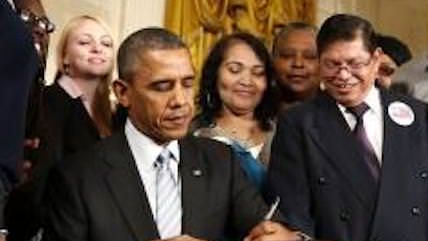Does a Minimum Wage Increase Come With a Price?

As promised in his 2014 State of the Union Address, President Obama signed an executive order yesterday raising the minimum wage to $10.10 an hour for a portion of federal contractors. Obama has also pressed Congress to raise the federally mandated minimum wage as well.
Obama reassured raising the minimum wage won't cause harm, but will "boost" the economy. Few economists would go this far however. Instead, most agree there is mixed evidence.
For instance, economists have found evidence that raising the minimum wage can lead to businesses laying off workers, hiring fewer workers, and reducing business expansion. Others have found that it raises prices of good and services many low-income Americans depend on, and may even discourage workers from receiving further training and education. In their meta-analysis of over 100 studies, economists David Neumark and William Wascher conclude "the minimum wage leads to economic distortions and often has unintended adverse consequences for the employment opportunities of low-skilled workers."
Is it really that hard to believe that raising the minimum wage is going to cost somebody something?
Nevertheless, other economists have failed to detect significant costs. For instance in Hristos Doucouliagos' and Thomas Stanley's meta-analysis of 64 studies, they conclude there are no "meaningful adverse" effects on employment. Although even economist and New York Times columnist Paul Krugman suspects that setting a minimum wage high enough, say at $20 and hour, "would create a lot of problems."
Former Obama administration economist Christina Romer synthesized the contradictory effects of a minimum wage hike in the New York Times, acknowledging the presence of small adverse effects depending on the size of the increase.
So are Americans willing to take the risk of harming job opportunities during a time of high unemployment, particularly among African-American teenagers (35.5%) and young people generally (22%)? It would be difficult to tell based on most public opinion polls which presents the question not as an economic trade-off, but as a benefits-only proposition.
In my recent op-ed in the Washington Times, I explain how public support for a minimum wage increase plummets as soon as Americans consider the possible costs. Read more here.


Show Comments (277)